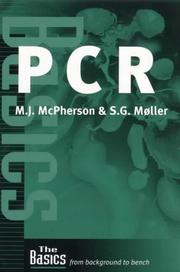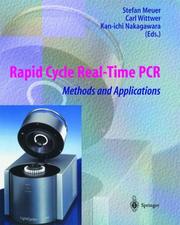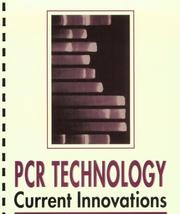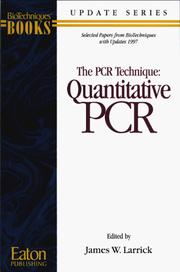| Listing 1 - 10 of 244 | << page >> |
Sort by
|

ISBN: 0429258399 9786610175239 1280175230 020334667X 0585425302 9780585425306 9780203346679 1859960170 1135326770 Year: 2000 Publisher: Boca Raton, FL : Taylor & Francis,
Abstract | Keywords | Export | Availability | Bookmark
 Loading...
Loading...Choose an application
- Reference Manager
- EndNote
- RefWorks (Direct export to RefWorks)
The ideal practical introduction to using PCR (polymerase chain reaction) techniques in the laboratory. The book enables a novice to understand the techniques described, how to use them and how to manipulate them if necessary. A concise information source for use both within the lab and out, providing basic theory, background material, and suggestions for suitable protocols.

ISBN: 9783540667360 3540667369 Year: 2001 Publisher: Berlin: Springer,
Abstract | Keywords | Export | Availability | Bookmark
 Loading...
Loading...Choose an application
- Reference Manager
- EndNote
- RefWorks (Direct export to RefWorks)

ISBN: 0849386748 9780849386749 Year: 1994 Publisher: Boca Raton (Fla.) : CRC press,
Abstract | Keywords | Export | Availability | Bookmark
 Loading...
Loading...Choose an application
- Reference Manager
- EndNote
- RefWorks (Direct export to RefWorks)

ISBN: 9781881299066 1881299066 Year: 1997 Publisher: Natick (Mass.): Biotechniques books,
Abstract | Keywords | Export | Availability | Bookmark
 Loading...
Loading...Choose an application
- Reference Manager
- EndNote
- RefWorks (Direct export to RefWorks)
Book
ISBN: 1912530252 Year: 2019 Publisher: Norfolk, UK : Caister Academic Press,
Abstract | Keywords | Export | Availability | Bookmark
 Loading...
Loading...Choose an application
- Reference Manager
- EndNote
- RefWorks (Direct export to RefWorks)
This indispensable manual is a compilation of review articles written by experts in the field of PCR technology. Topics covered include: principles of PCR, fluorescent chemistries, instrumentation, quantification strategies, extraction and purification of nucleic acids, sample preparation, controls for validation, primers and probes, standardization of methods, MIQE guidelines, mRNA expression and PCR arrays. This book provides a comprehensive overview of PCR theory, instrumentation and methods. The book represents an excellent, detailed guide for anyone interested in the development and use of PCR technology. It is a recommended purchase for all microbiology and molecular biology laboratories and university libraries.
Book
Year: 2002 Publisher: Totowa, N.J. : Humana Press,
Abstract | Keywords | Export | Availability | Bookmark
 Loading...
Loading...Choose an application
- Reference Manager
- EndNote
- RefWorks (Direct export to RefWorks)
Book
ISBN: 1107211174 0511700474 1282402641 0511657846 9786612402647 0511658397 051165653X 0511655681 0511818971 0511657080 Year: 2010 Publisher: Cambridge ; New York : Cambridge University Press,
Abstract | Keywords | Export | Availability | Bookmark
 Loading...
Loading...Choose an application
- Reference Manager
- EndNote
- RefWorks (Direct export to RefWorks)
The invention of the polymerase chain reaction (PCR) won the Nobel Prize in Chemistry in 1994 and remains one of the most important scientific discoveries of the twentieth century. More than 50,000 researchers in the United States use PCR replication technology, yet there is a significant absence of any recent publications on this subject. In this book, Dr Stephen A. Bustin, a world-renowned PCR expert, examines in detail the latest innovations and the overall impact of PCR on many areas of molecular research. The book contains personal reflections, opinions, and comments by leading authorities on the many applications of the PCR and how this technology has revolutionised their respective areas of interest. Bustin explains the ways in which PCR has overcome many obstacles in life science and clinical research and charts the PCR's development from time-consuming, low throughput, non-quantitative procedure to today's rapid, high throughput, quantitative super method.
Polymerase chain reaction --- Polymerase chain reaction. --- Diagnostic use.
Book
Abstract | Keywords | Export | Availability | Bookmark
 Loading...
Loading...Choose an application
- Reference Manager
- EndNote
- RefWorks (Direct export to RefWorks)
This publication documents the first meeting of the network on Buruli ulcer PCR laboratories in the WHO African Region, held at the Centre Pasteur du Cameroon in Yaoundé from October 21 to 24, 2019. The meeting focused on the standardization and improvement of laboratory practices for the diagnosis of Buruli ulcer, a neglected tropical disease caused by Mycobacterium ulcerans. Key discussions included harmonizing standard operating procedures, enhancing external quality assurance programs, and supporting national laboratories. The report highlights the challenges faced by laboratories in endemic countries, such as low PCR confirmation rates and delays in results. It also outlines WHO's strategy to improve diagnostic accuracy and data reliability by designating the Centre Pasteur du Cameroon as the Coordinating Centre for the external quality assurance program. The intended audience includes public health officials, laboratory scientists, and health policy makers involved in tropical disease management.
Polymerase chain reaction. --- Quality assurance. --- Polymerase chain reaction --- Quality assurance
Book
Abstract | Keywords | Export | Availability | Bookmark
 Loading...
Loading...Choose an application
- Reference Manager
- EndNote
- RefWorks (Direct export to RefWorks)
This publication by the World Health Organization outlines the establishment of a laboratory network and a new external quality assessment program for PCR-based diagnosis of Buruli ulcer in the African Region. It addresses the need for improved diagnostic accuracy in endemic countries following the cessation of a previous assessment program by the Institute of Tropical Medicine in Antwerp. The document aims to harmonize standard operating procedures, enhance laboratory performance, and ensure reliable data for WHO. It targets healthcare professionals and laboratory technicians involved in disease diagnosis and management.
Polymerase chain reaction. --- Quality control. --- Polymerase chain reaction --- Quality control
Book
Abstract | Keywords | Export | Availability | Bookmark
 Loading...
Loading...Choose an application
- Reference Manager
- EndNote
- RefWorks (Direct export to RefWorks)
This publication by the World Health Organization outlines the establishment of a Buruli ulcer laboratory network and an external quality assessment (EQA) programme for PCR-based diagnosis in the WHO African Region. The document provides a comprehensive framework for improving laboratory proficiency in diagnosing Buruli ulcer, a neglected tropical disease caused by Mycobacterium ulcerans. It highlights the transition of the EQA programme from the Institute of Tropical Medicine in Belgium to the Pasteur Center of Cameroon, a leading facility with a history of successful training and research. The book is intended for medical researchers, laboratory technicians, and health professionals involved in tropical disease management, aiming to enhance diagnostic accuracy and data reliability across endemic regions in Africa.
Polymerase chain reaction. --- Quality assurance. --- Polymerase chain reaction --- Quality assurance
| Listing 1 - 10 of 244 | << page >> |
Sort by
|

 Search
Search Feedback
Feedback About UniCat
About UniCat  Help
Help News
News